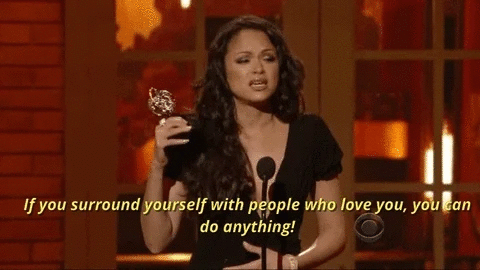At the beginning of every year, we are bombarded with “New Year New Me,” and big goals such as
| be healthier, | run a 5K | quit smoking |
| make/ save more money / spend less | read 50 books, | learn to play an instrument |
| find a new job, | travel the world, | find inner piece |
| give up soda or sugar forever | date people who are better for me / better relationships with family and friends, | go to the gym every single day, |
| Just to name a few. |
But are we setting ourselves up to fail and … ultimately feel horrible about ourselves?

The simple answer is yes, for the most part.
Research has found that 80% of us do not follow through with our New Year’s Resolutions. Most of us begin to fall off the wagon within the first month of the year.

Knowing this is pretty disheartening, but let’s talk about what would increase our chances of meeting the goals we have for ourselves.
Intention setting.
Intention setting is comparable to choosing a theme or direction to your actions.
Intention setting is a great place to start because it often prompts us to think about why something is our goal or important to us. Do you want to be healthier because being active and mobile throughout your life is important to you? Or because you’d like to be able to hike with your children or dog?
Many people pick one word for their intention. While you do this, think about what is behind that word, what would it bring to you if you embodied that word or have that goal.
Visualize – What would it look like, smell like, taste like, feel like, look like to live in this goal?

S.M.A.R.T. Goals
When creating goals, you should aim for them to follow this format
S – Specific
M – Measurable (answer the question – did I do this, or not)
A- Attainable
R- Reasonable & relates to me
T- Time-sensitive
What do these actually look like?
| No | Yes | |
| Specific, | I want to be healthy | I will go to the gym 3X per week |
| Measurable | I want to get my finances in check | I want to save 15k by 12/29/2020 |
| Attainable | I want world peace | I want to be at peace with myself ( a chunk of the time, and be okay when I’m not, because I am human). |
| Reasonable / Relatable | I will go to the gym every single day (when I currently have not been to the gym in 3+ months) | I will engage in 30 min. of movement 3X per week |
| Time-sensitive | I want a new job | I will have finished applying to at least 2 jobs by 6/30/2020 |
| Just to name a few. |
This time of year, many of us like to start fresh. But remember that you can restart every day, even every hour and you do not need something such as the beginning of a new year to give you permission to do so.
Bonus Tips
-
- Choose 1, maybe 2 goals to work on. If you choose 5, you’ll likely do 5 goals poorly. It is better to focus on 1-2 goals until that habit muscle is built and then you can add on more habits. What goal would bring the biggest impact to your life right now? Wording is important too. Avoid words such as never and always in your resolutions. Instead of a negative such as I will not eat fast food, try I will incorporate at least 1 serving of dark leafy greens daily.

-
- Break goals into bite-size pieces/ Have a plan. – You don’t swallow the whole pizza pie in one bite because it would be overwhelming, likely unenjoyable, and probably physically impossible. Cut your goals into smaller, more manageable pieces. Ex: I want to read 50 books by 12/29/2020 would look like I will read 4 books by 1/31/2020
- Have your goals visible to you. Write your goals on a notecard and tape it to your bathroom mirror so when you brush your teeth you can read it. Or make your goals your phone background, the label of your alarm each morning or reminders on your phone, etc. so that you see it at least once if not 2-3 times per day. This will help to prime your brain for opportunities that show up during your day relating to your goal. Out of sight is really out of mind when it comes to our goals.
- Schedule time to check in / reflect – this will look different for everyone and depends on your goals. Possibly once a month or once a week. This can look like journaling or checking in with another person.
- Have an accountability partner. Someone who has similar goals or someone you check in with and update each other on progress with goals. This type of relationship shouldn’t be harsh or shaming, but encouraging and curious. If you missed your goal, what were barriers for you this month? This relationship should be like a personal cheerleader.

-
- Be flexible with yourself – Life happens. Holidays, parties, grief, loss, surprises, life changes and adjustments are all things that happen. These events can take us away from our goals for some time, or even have us thinking about updating our goals to better reflect our needs and wants. Be flexible. Look at bonus tip 9.
- Progress, not perfection is the goal. There is no such thing as perfection, do not chase something that does not exist.
- Commit to trying something for shorter periods of time. 1-3 months and then updating. This is more time-sensitive and relevant to us today.
- Remember you can always try again, start again, at any moment. You do not have to wait until Monday, until the beginning of the month, or until the New Year. Your goals aren’t ruined if you fell off track for a week. The train will come when you are ready to get back on.
- Expect to be unmotivated. It’s natural and human. Plan ahead reminders of what motivates you to help combat this.
- Celebrate. Allow yourself to feel happy not only at the end of accomplishing mini-goals, or big goals, but during the process as well.
Click here for more information on Individual Therapy.
|
|
Joana Couto, LAC is a therapist at the Olive Branch Therapy Group. Joana works with children, teens, young adults and adults. Joana specialties include anxiety, life transitions, depression and trauma. If you are interested in working with Joana, contact us via email, phone or chat on our website. |




